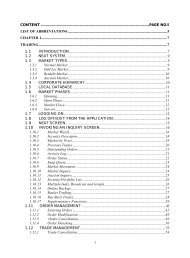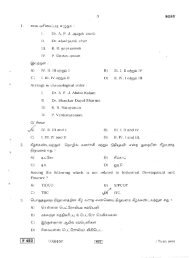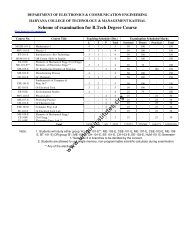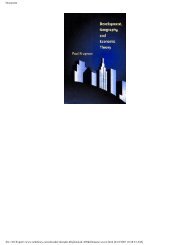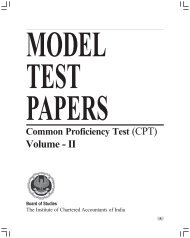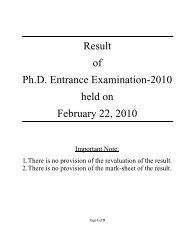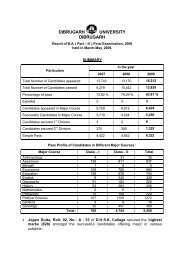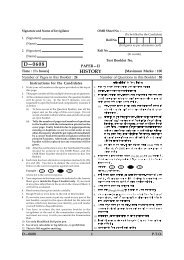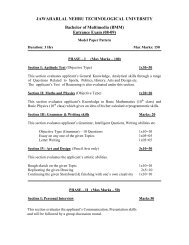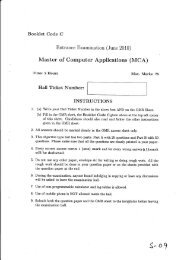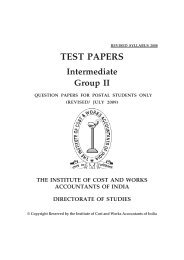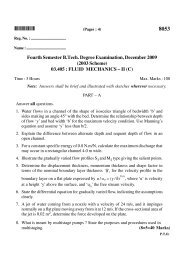UNIT – I Lesson 1 HRM – AN OVERVIEW Lesson Outline Nature of ...
UNIT – I Lesson 1 HRM – AN OVERVIEW Lesson Outline Nature of ...
UNIT – I Lesson 1 HRM – AN OVERVIEW Lesson Outline Nature of ...
You also want an ePaper? Increase the reach of your titles
YUMPU automatically turns print PDFs into web optimized ePapers that Google loves.
• The management and the workers should trust one another and work towards<br />
improving the system. They should be willing to contribute to the fulfillment <strong>of</strong><br />
organizational goals.<br />
• Workers participation schemes should be based on mutual trust and confidence and<br />
not enforced by law or compulsion, as this would defeat their very purpose.<br />
• Finally, it is important to evaluate the effectiveness <strong>of</strong> the worker participation<br />
programs from time- to <strong>–</strong> time and if required, necessary changes should be made<br />
to render them more acceptable and effective.<br />
QUESTIONS<br />
1. What is meant by industrial relations? What is their importance? Describe the<br />
conditions for good industrial relations.<br />
2. What are the causes <strong>of</strong> poor industrial relations? Give your suggestions to improve the<br />
legislation concerning industrial relation to our country.<br />
3. Explain clearly the machinery provided under the industrial dispute act 1947 for the<br />
prevention and settlement <strong>of</strong> industrial disputes.<br />
4. Define a grievance and indicate the organizational responsibility and principles or<br />
guidelines for handling grievances in an industrial grievance.<br />
5. Distinguish between the grievance and an industrial dispute. Indicate the forces that<br />
give rise to industrial conflict or industrial disputes with reference to Indian conditions.<br />
6. Examine the determinants and significance <strong>of</strong> good industrial relations in modern<br />
industrial society.<br />
7. Discuss the nature and role <strong>of</strong> collective bargaining. <strong>Outline</strong> an ideal process <strong>of</strong><br />
collective bargaining.<br />
8. Describe the requirements <strong>of</strong> an effective collective bargaining. State the points, which<br />
should be remembered in a negotiation process.<br />
9. Has collective bargaining Flourished in India? If not, what are the reasons? How can<br />
we make it work in India?<br />
10. What is collective bargaining? State the necessity and importance <strong>of</strong> collective<br />
bargaining.<br />
11. What is the importance <strong>of</strong> collective bargaining in industrial relations? Is collective<br />
bargaining successful in India?<br />
12. What are the essential <strong>of</strong> a good disciplinary system?<br />
13. What is “hot-stove rule”?<br />
14. Describe the various kinds <strong>of</strong> punishments, which are inflicted on a worker for<br />
misconduct?<br />
15. Describe the salient features <strong>of</strong> domestic Enquiry.<br />
16. What is meant by model standing orders? Are these orders applicable to all<br />
establishments? What is the scope <strong>of</strong> their applications?<br />
17. Describe the Indian law on discipline in industry.<br />
18. “Participation in management is claimed to usher in an era <strong>of</strong> industrial democracy.”<br />
19. Describe the function <strong>of</strong> shop council and joint councils under the 1975 scheme <strong>of</strong><br />
participative management.<br />
20. What are the essential functions <strong>of</strong> joint management council? Why have they not been<br />
successful in our country?<br />
21. Explain in your words, what empowerment means to you. Give an illustration <strong>of</strong> a<br />
time when you truly felt empowered.<br />
22. Why do you think participative management has not succeeded in our country?




